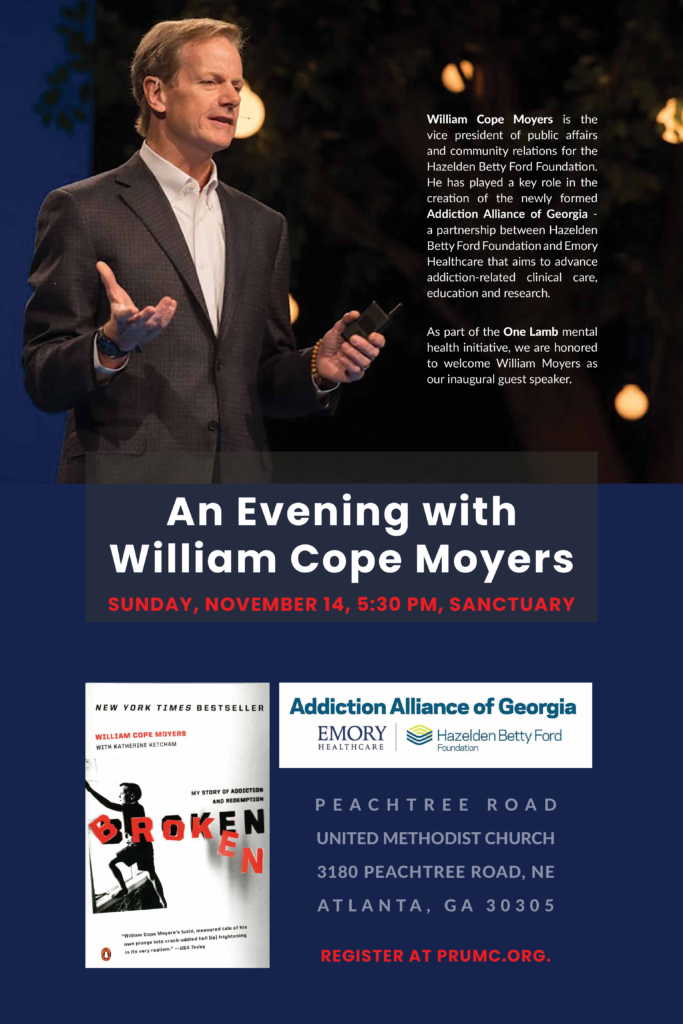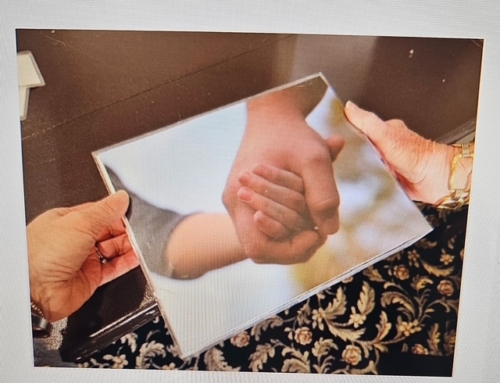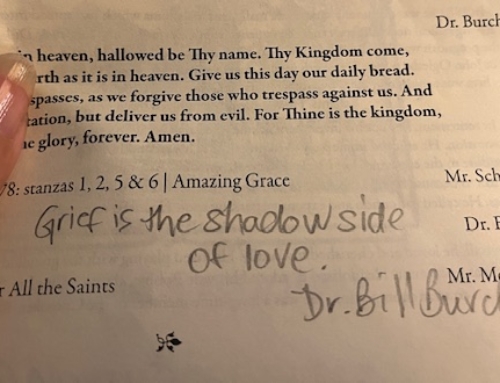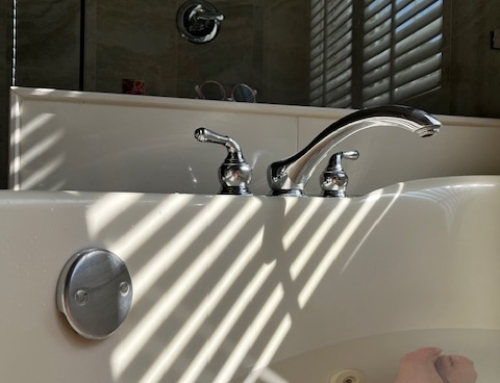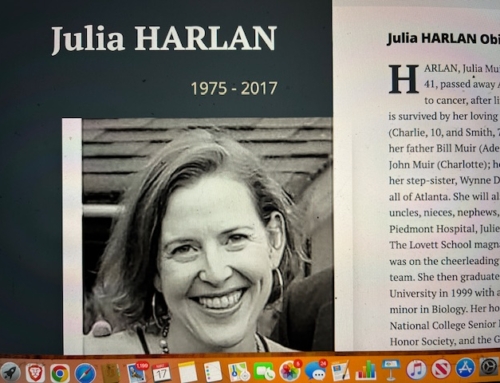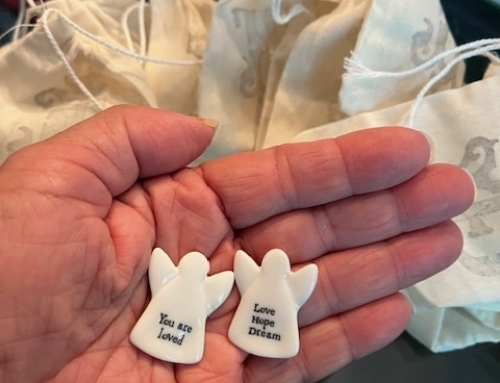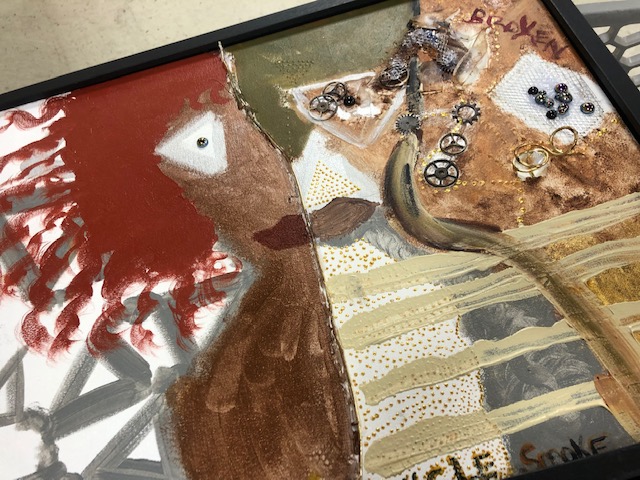
Good morning…
First, I snapped a photo of this original painting I saw on the shelf at Goodwill. The word “broken” in the top right corner is brought to life in a graphic display. At some point along life’s way, the experience of “broken” unexpectedly unravels each of us.
Next, I was deeply touched by a message in my inbox. This insightful excerpt depicts an incurable quality at the core of our very being.
******
October 13th Devotional by Jennifer Arnold, Lovett’s Lower School chaplain
In the words of Kate Bowler, “there is no cure for being human.” We might be the nicest… the most faithful… the most powerful… the richest… etc. but, no matter what, we are all human and the unsensible will come to each and every one of us at some point. With heavy hearts, Lovett saw this first hand three weeks ago (with the death of two Lovett dads in a tragic helicopter accident) and again this week (with the middle school daughter of a Lovett middle school teachers dying in a small engine plane crash): there is no cure for being human.
It is here then that the author of the letter to the Hebrews writes “we do not have a high priest who is unable to sympathize with our weaknesses, but we have one who in every respect has been tested as we are, yet without sin (without separating from God). Let us therefore approach the throne of grace with boldness, so that we may receive mercy and find grace to help in our time of need.”
This verse reminds me that even for Jesus, God’s own son, there was no cure for being human. Jesus felt the grief of loss, the pain of betrayal, and the feeling of abandonment. He also prayed for life to go differently than it ended up. And I believe God felt the fear and loss of his son’s death too. And so we have a God, through Jesus, who can sympathize with us no-cure humans. Sympathy in this case comes from the connection that exists between Jesus and all humanity. We are all in the same common boat of no-cure humanity. In this way, we are never alone.
So often we want to run or hide from the fact that there is no cure for being human. We like to pretend bad things only happen to other people or we know what to do to protect ourselves. This is a natural response. Yet, as counterintuitive as it might seem, this week my prayer is that we might find ways to lean into our no-cureness. As we recognize that there is nothing we can do to stop the unsensible from happening in our lives, may we be opened up to God’s grace and mercy. When we see that there is ultimately nothing separating us, may we be more willing to put aside our trite platitudes, our answers, and our advice. May we begin to offer all we actually have to give – our healing and genuine presence right here, right now. For as Kate Bowler says, “there is no cure for being human, but we are all good medicine.”
******
As we walk and talk together with our living Lord, whose entire body was broken for each one of us, may we mysteriously receive mercy and quietly find grace to help in our time of deepest need. For he is the Father of tender mercy and the God of endless comfort. He always comes alongside us to comfort us in every suffering so that we can come alongside those who are in any painful trial. We can bring them this same comfort that God has poured out upon us. And just as we experience the abundance of Christ’s own sufferings, even more of God’s comfort will cascade upon us through our union with Christ (2 Corinthians 1:3b-5, TPT).
Empowered by our compassionate God, we become good medicine for those who feel incurably broken.
…Sue…
P.S. For those in the Atlanta area:
“Sue, I was saddened to read about the news of suicide on these college campuses,” wrote program organizer Diane Moffett, themoffettfamily@gmail.com. “One of the plans we have for 2022 within the One Lamb Initiative is to host a dinner and roundtable discussion inviting young men and women in their 20s who have experienced the loss of friends by suicide. Our goal would be to create a place where feelings and thoughts can be expressed, learn about signs of someone in distress, and create connection and support within a faithful community. I wonder if any of your readers have interest in the planning and execution of this event?”
“Also, it’s not too early to promote the William Cope Moyers event on November 14 at 5:30 at PRUMC🥰,” she continued. “I guarantee it will bring hope and encouragement to those in recovery and those who have loved ones in recovery or wanting to pursue recovery. It will also provide education and learning so that we can all be part of breaking the stigma of addiction and recognizing it as a disease and not a moral failure.”
